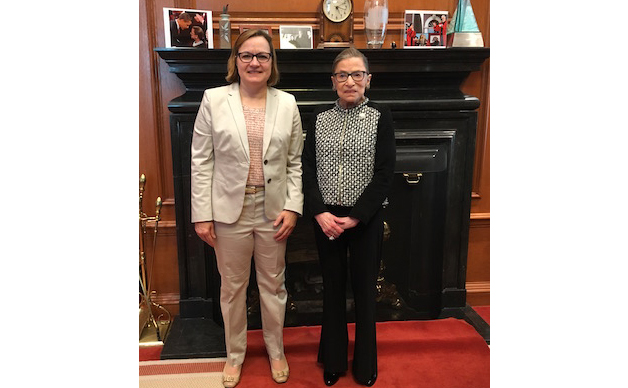Price lectures at U.S. Supreme Court on immigration law history

Met with Supreme Court Associate Justice Ruth Bader Ginsburg
While the president, Congress and the U.S. Supreme Court continue to clash over immigration, Professor Polly Price, a legal historian and expert in immigration and citizenship, says 19th century case law is still a powerful influence.
Price was invited to the U.S. Supreme Court to deliver the lecture, “The Supreme Court and the Chinese Exclusion Cases." The 2016 Leon Silverman Lecture, delivered May 11, was derived from Price’s research on citizenship and immigration law, and given in the court’s main courtroom.
The cases challenged the 1882 Chinese Exclusion Act, which suspended the practice of admitting Chinese laborers to the U.S.—though, as Price points out, Chinese merchants, teachers and other professionals could still enter freely.
Despite their age, the Chinese Exclusion cases remain the foundation for the plenary power doctrine, which gives the federal government extraordinary power over immigration with little oversight from the judicial branch.
The first Chinese Exclusion case was decided in 1889. Justice Stephen Field, who was appointed to the Supreme Court by Abraham Lincoln, wrote the opinion. It concerned laborer Chae Chan Ping, who arrived in San Francisco in 1875 and returned to China 12 years later to visit family. He left carrying a U.S. government-issued certificate granting him the right to return.
But when Chae returned, U.S. law had changed. “A few days before his arrival, a new law went into effect precluding the entry of all Chinese laborers,” Price said. His attorneys’ argument that the two countries were not at war, and thus he was not a threat to national security, didn’t matter. Soon after the Supreme Court’s ruling, he was taken by U.S. marshals to a ship sailing for China.
Audio from “The Supreme Court and the Chinese Exclusion Cases.”
“The Chinese Exclusion Case was unanimous and sweeping in its scope,” Price said. “The nation can deport any alien or all aliens, for any reason or for no reason. Its power of deportation, like its power of exclusion, the court deemed to be absolute and unqualified,” she said. “There was to be no role for the judiciary. The wisdom of such decisions, and even how they might be carried out, were not matters for judicial review.”
The case was also remarkable for its recognition of the implied powers of the federal government, or those not specifically cited in the Constitution. The concept of unreviewable powers strengthened federal hierarchy and gave Congress a police power of sorts, Price said.
Context and politics were relevant. By the turn of the past century, one in three San Francisco residents was of Chinese descent, Price said. Justice Field, the former chief judge of the California Supreme Court who wrote the first case’s opinion, would later run for president on a “get tough on the Chinese” platform (while still serving as a U.S. Supreme Court justice).
Railroad barons had sought and welcomed cheap labor to run the transcontinental railway west to the Pacific. But when the job was done in 1869, Chinese immigrants sought other ways to make a living. The Labor Reform Party called for Congress to protect American jobs and California held a referendum in 1879 to ban further immigration from China. Justice Field opined that Congress had the authority to “build a Chinese wall” at the nation’s borders, Price said.
Despite Chae Chan Ping’s defeat and deportation, another Chinese Exclusion case established an opposing milestone in immigration law. Almost 10 years after Chae’s case, the Supreme Court recognized birthright citizenship in the case of Wong Kim Ark. The facts were similar, as Wong Kim also left the country in 1890 and was denied reentry. Wong Kim, however, was born in San Francisco.
“In a 7-2 decision, the Supreme Court agreed with Wong Kim, holding that the simple fact of birth within the territorial U.S.—and not race or parentage—determined that he was a U.S. citizen,” Price said.
Price’s talk was the first of four in the 2016 Leon Silverman Lecture Series, “The Supreme Court and the Progressive Era.” She was introduced by Emory Law Advisory Board member (and Emory University trustee emerita) Chilton Davis Varner 76L, who is a partner at King & Spalding where Price worked as a young lawyer. While she was an excellent associate, Price is a born professor and historian, Varner said.
During her time at the Supreme Court, Price also met with Associate Justice Ruth Bader Ginsburg, who wrote the foreword for Price’s 2009 book, Judge Richard S. Arnold: A Legacy of Justice on the Federal Bench. Price clerked for the progressive 8th Circuit judge, who Ginsburg characterized as “a prince among jurists and men.”